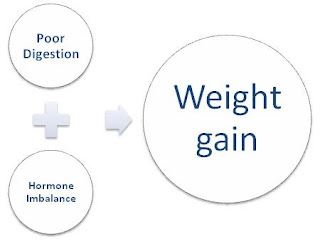Friday, June 8, 2012
Exciting New Research - Tummy Troubles Cause Hormonal Havoc
Saturday, August 7, 2010
Do You Have Tummy Fat That Won't Budge?
How to avaoid weight gain during the festive season
With more of our processed food containing Trans Fatty Acids and 'hormonal disruptors', also known as endocrine disrupting chemicals (EDCs), it is little wonder that after a weekend of playing taxi and event manager, with a nibble here and a nibble there, one can be left feeling like their wardrobe favorites are getting a little on the snug side.
The problem is that party foods are 'trigger foods' and they get the better of us by setting off what appears to be an irrational chain reaction that causes us to over-eat and binge. We see it in our kids with a 'sugar buzz', but what actually is happening to us?
These foods entice us in and once you start its hard to stop. They are almost addictive in nature due to the refined sugars and additives in many of them. We end up scoffing down one piece of cake, beating ourselves around the head with guilt momentarily and then lining up for another slice later. The dreaded 'leftovers' in the fridge can call like a bright beacon, and all the healthy stuff just won't scratch the itch...it's the cake once again and there it is waiting for you. The unfortunate result is weight gain and broken goals, dreams and seams!
To read full article click here
The Impact Of the New Age
Industrial civilization first invented the machine and then took it as its life model. In the name of productivity; our health, environment and our landscape is threatened. We are enslaved by speed and have succumbed to the fast life, which disrupts our habits, pervades the privacy of our home and forces us to eat fast foods.
Discretionary time has shrunk, so theres less time to be active & less time to spend sourcing & preparing fresh food.
Along with this is the emergence of “ready to go” meals lining our supermarket shelves. With continuing drought threatening our food chain – it is becoming increasingly difficult to purchase reasonably priced vegetables & produce. Often consumers are forced to purchase poor grade, highly manufactured products due to financial constraints. To read full article click here


